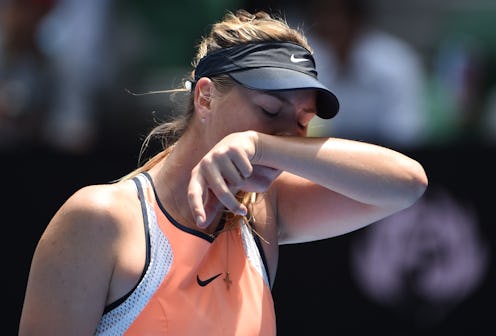News
Maria Sharapova Failed A Doping Test
On Monday, tennis star Maria Sharapova announced that she failed a doping test in January at the Australian Open. The 28-year-old admitted that she has been taking Mildronate since 2006, but the drug was only added to the banned substances list this year. Soon after her admission, the BBC reported that Sharapova had been provisionally suspended from playing tennis. According to a report published by the National Institute of Health, Mildronate (also known as Meldonium) is an anti-ischemic drug used to treat heart ischemia and to improve cerebral circulation disorders and central nervous system functions. This might sound like no big deal, but according to another report published by the NIH, the drug "demonstrates an increase in endurance performance of athletes" and "improved rehabilitation after exercise." Therefore, it was added to the World Anti-Doping Agency's banned list beginning Jan. 1, 2016.
In a press conference, Sharapova said that she was first given Mildronate, which she said she did not know was also called Meldonium, by her family doctor 10 years ago for several health issues that she was having, including getting sick with the flu often, having irregular EKG results, and possible indications of diabetes — a disease she said her family has a history of.
I made a huge mistake, and I've let my fans down. I let the sport down that I've been playing since the age of four that I love so deeply. I know that with this, I face consequences, and I don't want to end my career this way, and I really hope that I will be given another chance to play this game.
Sharapova is an Olympic medalist who has five Grand Slams under her belt, generally ranking alongside Serena and Venus Williams in the top three female tennis players. She is one of only 10 women to hold the career Grand Slam, and has been the highest-paid female athlete in the world for the past 11 years. While she's been suspended, it's not yet clear for how long. Sharapova said that she takes full responsibility for the failed test. John Haggerty, a lawyer who is representing her, told The New York Times that Sharapova wants to be upfront and move the process along. "And that is why she’s acknowledged that she’s failed the drug test, and now we are just going through the I.T.F. [International Tennis Federation] process to discuss with them why we believe that either no, or a very limited, sanction is required based upon all the facts surrounding why she was taking it, for how long she’s been taking it and the medical issues she was taking it for."
